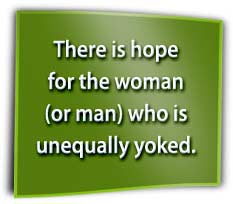
 MAGINE FOR A MOMENT THAT YOU?RE sitting in church. You are listening to the preacher while your attention wanders to the people sitting in front of you.
MAGINE FOR A MOMENT THAT YOU?RE sitting in church. You are listening to the preacher while your attention wanders to the people sitting in front of you.
There?s Sally, who always sits with another family and helps to care for their children. Muriel is sitting alone two rows behind Sally. Then there?s Dave with his preadolescent son. Across the aisle from Dave is Sheryl. Her two little boys are wriggling, and look like they?ll scream at any moment.
Your mind does a quick calculation: four halves of married couples in church. Each with a husband or wife at home. Each with a spouse who doesn?t believe.
You?ve forgotten to listen to the church service now.
How many other ?single married? people are there in your church? You come to the conclusion that about one quarter of couples don?t attend your church together.
And then your eyes fall upon another couple.
He?s the church treasurer, and she?s the kindergarten Sabbath school leader. They are a dynamic couple. Things get done with these two in charge. They sit in church with a child on either side. He has his arm around her. She has an open Bible on her lap. The children are reading.
They look an ideal couple. But you remember an incident not too long ago, when she telephoned in tears because he wouldn?t lead family worship; he wouldn?t pay tithe; Sabbath was a chore; and he really came to church only to keep up appearances. ?He tricked me,? she had cried. ?I thought I was marrying a believer.?
And then Paul?s admonition rings in your ears: ?Be ye not unequally yoked together with unbelievers? (2 Cor. 6:14).
What Is Unequally Yoked?
Unequally yoked is a biblical term. It is used only once in Scripture, when the apostle Paul in Second Corinthians 6:14 warns Christians not to be bound together with unbelievers. The literal Greek translation of the term means ?to be paired with another kind?; coupled to someone of a different soil.
In the days when Scripture was written, oxen were beasts of burden and the yoke was a commonplace fixture. The yoke consisted of a wooden frame or bar with loops at either end, and was used to hold the animals? heads in place and maintain balance between them. The yoke was fitted around the necks of a pair of oxen, harnessing them together, making them a team.
 It is interesting how a yoke works. It was constructed so as to force each ox to pull an equal share of the load. It bound the animals together. Consequently, if one pulled ahead or held back, the other member of the team was hindered. The yoke caused physical pain, choking the one that pulled ahead or pinching the neck of the one that lagged behind. Because of this discomfort and the restrictiveness of the yoke, the oxen usually kept a common pace, moving in the same manner and traveling in the same direction.
It is interesting how a yoke works. It was constructed so as to force each ox to pull an equal share of the load. It bound the animals together. Consequently, if one pulled ahead or held back, the other member of the team was hindered. The yoke caused physical pain, choking the one that pulled ahead or pinching the neck of the one that lagged behind. Because of this discomfort and the restrictiveness of the yoke, the oxen usually kept a common pace, moving in the same manner and traveling in the same direction.
So when Paul uses the term unequally yoked, he is implying that if a Christian teams up with an unbeliever, the pairing will hinder their walk with the Lord, restrict their freedom in Christ, and cause an imbalance of responsibility in the relationship.
People in this position will agree to the truth of this principle. They are united in a permanent marriage union with someone who is not spiritually their equal. So they are burdened with an overload of spiritual responsibility. They are faced with the task of having to live a godly life beside someone who prefers to be part of the worldly system rather than God?s kingdom.
Sometimes the believer is dragged toward things they believe are inappropriate for a Christian. But they are yoked. Sometimes they are pulled against their will into situations in which they want no part. But they are yoked. It is difficult walking the path of righteousness when the one to whom they are harnessed is following the way of the world. But they are yoked.
Frequently the believer must draw back, creating conflict and friction. Sometimes they are hurt or wounded. Or they grow discouraged from the weight of the burden. If you were to ask them if they are relaxed in their marriages, they would tell you they are not. They may be happy, but they are not comfortable because they are not equally yoked.
How could a Christian get into such a predicament?
There are four ways that a Christian can become unequally yoked.
1. An unbeliever marries another unbeliever, then at some point one begins to follow the Lord. A new believer married to an unbeliever has a monumental challenge, and it is important that other believers realize that to be unequally yoked was not a position this person chose to be in.
2. A believer marries an unbeliever, thinking he is a Christian when he is not. Many are the men* who are able to put on a ?face of godliness? for the duration of a courtship, only to reveal their true selves after the knot has been tied. A believer in this situation will rebuke themselves constantly for having been tricked. Usually, however, this man has not only tricked his spouse, but has tricked those in the leadership of the church as well.
3. Some people marry a nonbeliever in ignorance. There are people who don?t know that if they love God, they need to marry someone who also loves God. Some people have never heard Paul?s admonition, even though they have been raised by Christian parents.
4. ?I?ll win him later.? Marrying a nonbeliever with a view to winning him to the Lord later is a blatant disregard for the instruction of God. To marry an unbeliever puts a believer at immediate risk of more temptation, and less godliness.
What happens to a marriage and family when a woman has chosen to join the holy with the unholy?
Constant conflicts disrupt the marriage relationship. Children are faced with the negative example of an ungodly father. Often a woman is forced to choose between the Lord and the man she loves. It bothers her that her mate is not going to heaven. The most important person in her life cannot provide her with spiritual guidance or counsel.
What Ellen White Has to Say
In her book The Adventist Home Ellen White strongly expresses her opinion about marriages with unbelievers. She calls them ?forbidden marriages.?1 She makes reference to Old Testament times when God commanded Israel not to marry with the idolatrous nations around them.2 She then refers to New Testament times when Paul admonished the early Christians to not be unequally yoked with unbelievers.3 Ellen White?s overriding emphasis dwells on the promise of an eternity with Jesus. How could marrying a nonbeliever help a believer to walk the Christian way, to overcome the everyday problems and temptations, and to keep their eyes firmly fastened on Jesus? coming?
 Ellen White uses Solomon as an example. Solomon married Pharaoh?s daughter. He hoped that his Egyptian wife might be converted. And she was. But Solomon grew ever more self-confident, and he began to carry out the Lord?s purpose in his own way.
Ellen White uses Solomon as an example. Solomon married Pharaoh?s daughter. He hoped that his Egyptian wife might be converted. And she was. But Solomon grew ever more self-confident, and he began to carry out the Lord?s purpose in his own way.
?Many professed Christians think, like Solomon, that they may unite with the ungodly, because their influence over those who are in the wrong will be beneficial; but too often they themselves, entrapped and overcome, yield their sacred faith, sacrifice principle, and separate themselves from God. One false step leads to another, till at last they place themselves where they cannot hope to break the chains that bind them.?4
Hope in the Midst of Trials
There is hope for the woman who is unequally yoked. She can be assured that God does not wish ?that any should perish, but that all should come to repentance? (2 Peter 3:9). So whether she was placed in her position by choosing to follow God, or attained her status as an unequally yoked wife because she was disobedient, she can depend on God?s grace. He wants, more than she does, for her mate to come into the kingdom.
The woman who is unequally yoked will always be aware of the fact of her situation. But she must also remember that she is a child of God, and a recipient of His magnificent love. Even if she married in total disobedience, that sin was paid for on the cross. And the Lord wants her to live a fruitful, abundant life. She must cling to the positive blessing that she is a child of God, and is completely and perfectly loved by her Savior.
_________________________
*Women fall into this category as well. However, since this article is geared mainly toward women, the masculine pronoun is used to represent the unbeliever.
_________________________
1 Ellen White, The Adventist Home, Chap. 9.
2 Deut. 7:3-6.
3 2 Cor. 6:14.
4 Ellen White, Fundamentals of Christian Education, p. 500.
_________________________
Christine Miles writes from Auckland, New Zealand. She has a passion for children?s ministries, both in the church and in the community.